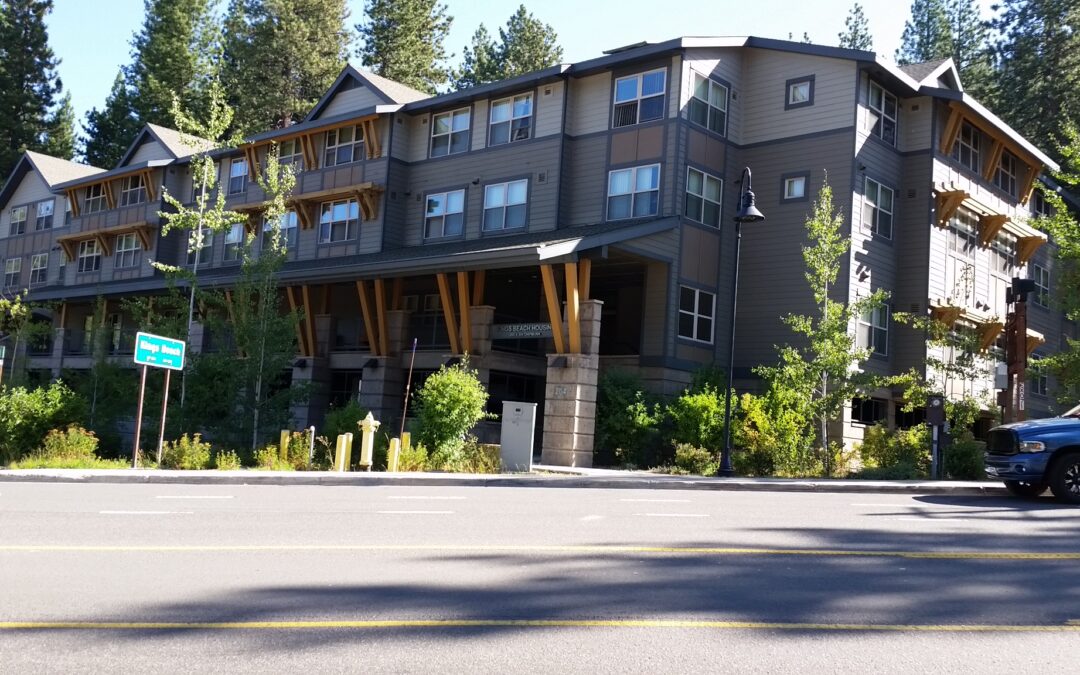NEWS RELEASE
Contact: Victoria Ortiz, 775-589-5251
For Immediate Release July 6, 2023
Lake Tahoe, NV/CA –Affordable housing in the Lake Tahoe Region is getting a boost thanks to a $2.4 million grant from the California Department of Housing and Community Development (HCD) awarded to the bi-state Tahoe Regional Planning Agency (TRPA), the agencies announced today. With the assistance of regional government partners, the funding will help make housing, equity, and climate goals a central focus of land use and water quality programs, according to TRPA.
As the federally designated Metropolitan Planning Organization (MPO) for the basin, TRPA was also awarded a $567,000 grant through a related California program to advance housing choices, reduce vehicle miles traveled, and build upon the region’s Sustainable Communities Strategy, a key transportation policy document.
“These grants are game changers for Lake Tahoe and our communities,” TRPA Executive Director Julie Regan said. “They are providing the resources for our region to leverage Tahoe’s unique limits on development while bolstering affordable housing and environmental improvements, and at the same time, better engaging with underserved communities.”
Driven by the urgent need for affordable housing solutions, TRPA’s Governing Board is re-examining policies that have had the unintended consequence of incentivizing luxury development versus more affordable housing types.
The Lake Tahoe Region’s development standards are central to protecting Tahoe’s water quality and reducing the impact of new homes and businesses on the environment. However, most development in the Tahoe Basin was built decades ago and pre-dates these standards. In 2012, TRPA updated the Regional Plan to encourage redevelopment of pre-existing homes and businesses so they can meet modern water quality standards and help create more walkable town centers. While progress is being made, the agency says it is imperative to continue environmental redevelopment that simultaneously increases affordable housing options.
“Lake Tahoe can’t grow its way out of these challenges,” Regan said. “While our unique integration of environmental protection and growth management has made great strides in cultivating sustainable communities, we’re facing a new housing affordability crisis. Now we must more meaningfully engage with Tahoe’s disadvantaged and historically underserved communities to find new housing solutions for everyone.”
While most funding support for affordable housing in the Lake Tahoe Region has gone to construction of new housing on vacant land and financial assistance to individuals, the scale of the challenges in the Tahoe Basin require solutions coming from every sector, according to TRPA.
Data compiled by the Tahoe Prosperity Center shows just 28 percent of Tahoe residents can afford the median-priced home, the cost of which tripled from 2012 to 2021. A little more than 50 percent of homes in the region are occupied, with some areas being 90 percent second homes.
The agency worked closely with partner organizations and local jurisdictions to determine the most impactful set of programs for Tahoe.
“El Dorado County was honored to partner with TRPA on securing the HIT grant and we look forward to continuing the work to deliver transformative housing changes in the Tahoe Basin,” said Brendan Ferry, deputy director of El Dorado County’s Tahoe Planning and Stormwater Division.
The funds will be applied over several years to deliver:
- An equity and climate assessment that will examine the impact of existing policies on affordability, access to opportunity, and impacts related to climate change such as greenhouse gas emissions and the region’s ability to respond to climate-related events.
- A community engagement plan to establish long-term, two-way engagement between communities and agencies with a particular focus on disadvantaged and historically underserved communities.
- An update of the regional growth management and development rights systems.
- A streamlined environmental review process for transit-oriented, multi-family developments that meet water quality and other environmental goals.
- Environmental analysis of proposed updates to the Regional Plan.
The smaller, $567,000 grant will help the agency move forward on priority housing actions identified by a special working group of TRPA Governing Board members, local government and non-profit partners, real estate professionals, and affordable housing experts. The Tahoe Living Working Group prioritized amendments to certain building standards to make it more financially feasible for private property owners and builders to construct deed-restricted workforce housing for multiple income levels. Funds are also available for outreach and engagement and creation of tools to help the public use the new codes if approved.
The grant funds will be used to advance the feasibility of constructing multi-family rental units, like duplexes and apartments, in and around town centers. Amendments to the regional code of ordinances currently under review could increase regional opportunities for building height, density, and land coverage if a project is permanently restricted to more affordable rates. For more information, visit trpa.gov/housing.

The Domus Project in Kings Beach, California, completed in 2013, provides affordable, transit-oriented housing in Placer County. Affordable housing in the Lake Tahoe Region is getting a boost thanks to $3 Million in transformative housing grants awarded to the Tahoe Region. Photo credit: TRPA.

Visual renderings like this one demonstrating what a potential affordable housing project could look like in Lake Tahoe are one of many community engagement tools that the grants will support. Photo credit: Design Workshop.
###
The Tahoe Regional Planning Agency leads the cooperative effort to preserve, restore, and enhance the unique natural and human environment of the Lake Tahoe Region, while improving local communities, and people’s interactions with our irreplaceable environment. For additional information, contact Victoria Ortiz, Community Engagement Manager, at (775) 589-5251, vortiz@trpa.gov.

